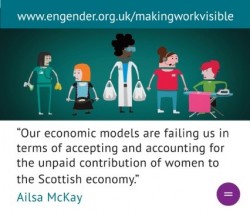Making Work Visible
It is clear that one of the biggest barriers to gender equality is the economic inequality between women and men in Scotland.
This exists in the formal economy where the gender pay gap and lack of access to sustainable jobs means that women earn less and have less influence than men. But there is also the additional problem of the invisible work that (predominantly) women do and which isn't recognised by traditional economic calculations. This includes caring, raising children and other unpaid work - all of which contribute to Scotland's economic wellbeing.
For the past few years, we've been asking women to share the invisible work they've been doing. We've been doing this through an online survey, commissioning photo essays, and using the twitter hashtag #MakingWorkVisible.
Read more about it on our dedicated website makingworkvisible.engender.org.uk.
Introducing Marginal-eyes
Why is some work invisible?
The economic calculations of governments and international financial institutions (like the International Monetary Fund which monitors the 'economic health' of countries) normally only see paid work as contributing to the economy. Of course we know that's not true, and it misses out the vast value to society of care work, volunteering and contributing to our communities.
- The UK household satellite accounts found that the value of informal childcare in 2010 was £343 billion – equivalent to 23% of GDP
- A recent OECD study indicates that around one third to a half of all valuable economic activity is not accounted for in traditional measures of economic performance ie GDP
Why is this an issue of women's rights?
Women still do the majority of invisible work including housework, raising children and caring for vulnerable relatives. Don't believe us?
- 62% of unpaid carers are women (Census 2011). Twice as many female carers rely on benefits than male carers, at a rate of £1.55 per hour (Carers Scotland).
- From the 1970s to the 2000s, men’s core daily domestic work – cleaning and cooking – increased by a rate of about one minute per day per year.” (Beatrix Campbell, End of Equality)
- Women devote, on average, more than twice as much time to household work as men. (OECD)
- Across the globe women undertake the majority of unpaid care work – only one third of their total work activity is spent in market based paid work (OECD)
These issues have been compounded in recent years with the savage cuts to public services. Women are the first to bear the brunt of cuts, and are forced to take over services previously offered by the state. You can read more about our responses to welfare cuts in our briefings and blogs, and you can also read the late Ailsa McKay's brilliant speech to the Education Institute Scotland on women and austerity.
What can we do?
There are lots practical measures which Governments could take to start recognising the value of invisible work to the economy. Some of these are advocated by the Women's Budget Group (for the UK), the Scottish Women's Budget Group (for Scotland), WISE Women and the Citizen's Income Trust.
There are also some things you can do!

- Join the Scottish Women's Budget Group and contribute to their work putting gender equality at the heart of budget considerations.
- Join Engender to hear the latest news about gender equality, meet fellow feminists and feed in to consultations.
- Make invisible work visible! Please share our film, and take your pick of our great graphics to share on social media (
#MakingWorkVisible) to help spread the word about this issue.
Downloads
 Gender Matters Manifesto: Twenty for 2016
This manifesto sets out measures that, with political will, can be taken over the next parliamentary term in pursuit of these goals.
Gender Matters Manifesto: Twenty for 2016
This manifesto sets out measures that, with political will, can be taken over the next parliamentary term in pursuit of these goals.

Newsletter
Sign up to receive our newsletter here:
Sign up to our mailing list
Receive key feminist updates direct to your inbox: